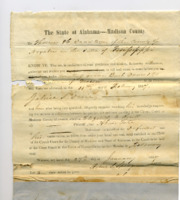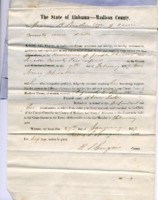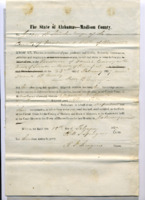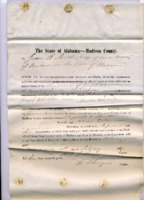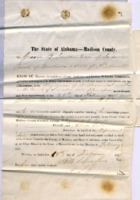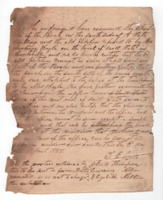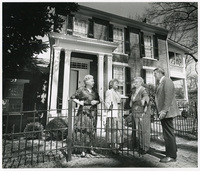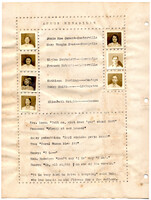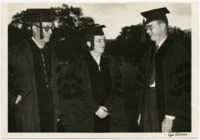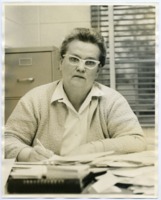
Browse Items (56 total)
Sort by:
-
Deposition of Dr. Gabriel S. Davies.
As a witness for the defendant, Abner Tate, Dr. Davies' deposition includes a list of the questions asked and the corresponding answers on the blue document. Davies is asked about Elizabeth Routt and her husbands, particularly Alexander Jeffries. Dr. Davies is asked his professional medical opinion about the cause of death to which he states was believed to be from "inflamation of the stomach and perhaps the bowels." Dr. Davies also states that he believed him to have been sick approximately six to eight weeks. He also compares the symptoms of Jeffries and Brown, Routt's fifth husband. -
Deposition of Nancy Whitaker.
Nancy Whitaker acted as a witness for the defendant, Abner Tate. Nancy responds to questions about Alexander Jeffries, her father, and Elizabeth Routt. She expresses her belief that her father was poisoned by Routt though she was not present until the morning after he died. Nancy details the dark color of her father's body and how it was swollen and "unnatural" in appearance. She also includes the rumors she has heard regarding several charges brought against Routt. She concludes by stating that it is her opinion that Routt is guilty in the case of her father's death. -
Depositions of Daniel Curry and Polly Curry.
The depositions include the questions asked and the answer. Daniel Curry's deposition is first. The questions regard Elizabeth Routt and her husbands, particularly her third, Alexander Jeffries, whom Daniel Curry knew well. He details his death, claiming he saw him the day he died and he did not appear sick at that time. Later questions interrogate Curry about Routt's character and ability to murder her husbands. Polly Curry was asked the same questions as her husband. Her responses were similar. She stated that Routt was well thought of prior to the death of her third husband, Jeffries, the lost her good standing after that. Polly adds that she heard Routt say that she was glad her second husband was dead following his death and that she wished her last husband, Mr. Routt, was also dead so she could "live in peace." She also includes the rumors that Mrs. Routt was "too intimate" and charged with sleeping with two of her slaves, and had stolen cotton previously. -
Depositions of Joseph Whitaker and Newton Whitaker.
The Whitakers were witnesses for the defendant, Abner Tate. Joseph Whitaker's deposition is first. He answers questions regarding Elizabeth Routt and her husbands, particularly the death of Alexander Jeffries. Joseph states that it is his opinion that Jeffries was poisoned. He also states that rumors have spread that she had ordered a slave to murder Abner Tate. Newton Whitaker's desposition is second. He also answers questions regarding Elizabeth Routt and her husbands, including the death of Alexander Jeffries. Newton states that he is also of the opinion that Jeffries was poisoned. Like Joseph, he also adds that she is said to have destroyed the lives of her husbands, stole cotton, and sought to harm Abner Tate. -
Depositions of William Ashworth and Thomas O. Gill.
Ashworth and Gill are witnesses for the defendant, Abner Tate. Ashworth's deposition is first. He answers questions regarding Elizabeth Routt and her husbands, particularly of her character and what others said and thought of her. He includes at the end that he has heard of her destroying the lives of her husbands, stealing cotton by way of her slaves, and was accused of having one of her slaves shoot Abner Tate. Thomas O. Gill's deposition follows. He is asked about Elizabeth Routt and her husbands as well, including her character and what others said and thought of her. Gill also confirms hearing of the "great many charges alleged against her." Gill is then cross examined by the plantiff's, Elizabeth Routt, counsel. He is asked whether the charges against her character are of his knowledge or the publics'. Gill names those whom he heard the information from and admits that the charges were rumors rather than facts. He also details the pamphlet written by Abner Tate that he received from an unknown sender. He was also asked about the sicknesses of Routt's husbands and the attending physicians which he was unable to answer. -
Desposition of T. O. Gill
The deposition of T. O. Gill. In his statement, Gill calls for a retrial at this document certifies that despite Mrs. Hazel's statement, Abner Tate's kitchen could not be seen from any part of the porch. The statement further details other areas of the house pertaining to the witness's statement. -
Excerpt from the Livingston High School "Annus Mirabilis" yearbook, 1932.
This page includes the photo of Frances Roberts, who later became a UAH history professor and the namesake of Roberts Hall. Roberts was a Senior II, or a junior, in high school at the time of this yearbook's printing. -
Frances C. Roberts at commencement at the University of Alabama.
This photo was taken at the time of Roberts' doctoral graduation from the University of Alabama in Tuscaloosa, Alabama. She was the first woman to receive a Ph.D. in history from the University of Alabama. On either side of her are Howard C. Elliot, Jr., Ph.D. in biochemistry, and Elmer Dean Calloway, Ph.D. in chemistry.
